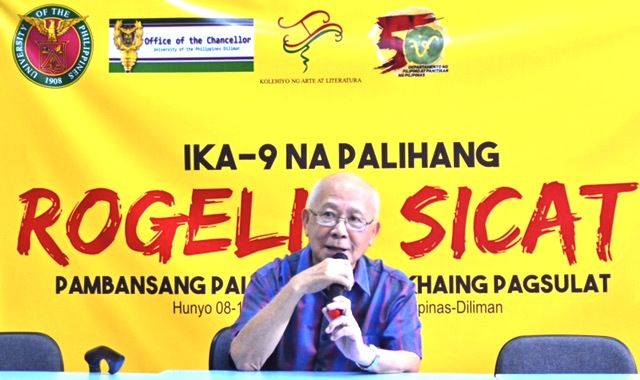PH language experts say Filipino is being born
LOS ANGELES — As the month-long celebration of “Buwan ng Wikang Pambansa” (National Language Month) heads to a close August 30, educators and language experts agree that “Filipino” is an evolving language.
Following governmental mandates supporting a Filipino national language, Filipinos have learned to accommodate in their everyday lives over the years, substantial additions of words and phraseology from the vernacular of every region of the country.
Chair of the Komisyon sa Wikang Filipino (KWF) and the National Commission for Culture and the Arts (NCCA) Virgilio Almario said the national language is rapidly being enriched through daily use and through other manners of usage in different places and situations.

National Workshop on Creative Writing, founded by Reuel Molina Aguila and Jimmuel Naval, professors at Department ng Filipino at Panitikan ng Pilipinas, University of the Philippines, Dililman. Entering its 11th year next year. CONTRIBUTED
Almario, also known as Rio Alma, is a poet, literary historian and professor who has been acclaimed as one of the country’s National Artists. He is regarded as one of the country’s premier poets writing in Filipino. “It’s no longer Tagalog in its pure form. “Kahit ako, mahirap ko nang maintindihan yung mga sinulat halimbawa ni Rizal nuon” (Even I have a hard time understanding what Rizal wrote in his time).
Wikang Pambansa
President Manuel L. Quezón proclaimed Tagalog as Wikang Pambansa in 1939. The language was further renamed Pilipino in 1959 by Secretary of Education Jose Romero. The 1973 Constitution declared Pilipino to be co-official, along with English, and mandated the development of a national language, to be known as Filipino.
In January 1997 Philippines President Fidel V. Ramos, declared August as Buwan ng Wika, after the birth month of Quezon. The Department of Education sponsors events during Buwan ng Wika usually with competitions, cultural presentations, exhibits involving students following different themes.
Almario said the celebration aims to increase awareness of the different languages found in the country. It is not just celebrating the Filipino language but rather, appreciating the country’s culture as a whole.
“Our national language is changing, which cannot be defined. ‘Filipino’ is what is being used by people in the Philippines in daily conversations. This is the language for example, being used by two people both from different regions of the country who have their own language or dialect or mother tongue,” Almario told the INQUIRER.net in a phone interview. “Some concepts and words that have common meanings need not be translated like ‘condo’ or ‘mall.’”
‘Nothing wrong with changes’
“There’s nothing wrong in changes within our language because if we are too old-fashioned we might not be understood by the younger generation or millennials,” Almario added.
Fernando Sosmena, of Orange County, a University of the Philippines (UP) law graduate who hails from Cebu and immigrated in the US with his wife, a retired nurse originally from Tacloban Leyte, describes himself as Cebuano and his wife, Virgie, as Waray. Although they both come from the Visayan region, they each have their own dialects.
“For convenience, we use Tagalog in our conversations with each other as well as words from our own,” Sosmena said. At home, they use English to talk with their children and grandchildren.
Filipino is the language of instruction in many colleges and universities now such as the University of the Philippines and Ateneo, being in the forefront, Almario added.
Another well-known proponent of the Filipino language, Palanca Awards Hall of Famer and professor of Creative Writing at the University of the Philippines, Dr. Reuel Molina Aguila told INQUIRER.net, “Filipino is here to stay as a dominant language, generally used today in the Senate and House hearings.”
KWF bestowed Aguila a “Lifetime Achievement Award, among others, for his important work in propagating the national language of the country.
Used in courts
“Filipino is being used in many court systems in the country because the plaintiffs and the accused are able to articulate their points better than using legalese terms,” Aguila explained.
He said there has been a vigorous interest in the propagation and use of Filipino in various sectors for the last four decades. His classes on Creative Writing in Filipino at the UP are always full. “We had to compromise on tapering the class size to 15, although I prefer 10 students per class for a better one-on-one interaction.” He’s one of the very few (if not the only one) who teaches in Filipino all genres – poetry, plays, script for radio, TV, film essay.
Aguila pointed out that the country’s up and coming Filipino literary practitioners responded enthusiastically to his founding of Kataga, Samahan ng mga Manunulat sa Pilipinas, a group of authors, award winners in various genres, which has become one of the biggest associations of writers in Filipino. “Every month and the whole year is buwan ng wika for us,” he said.
In August they have Campus Tagaan, a workshop for Manila- based campus writers in Filipino. It grew with seven chapters in Quezon City, Manila-South, Lucena-Performing Group, Lucena- Literature, Zambales and Kataga Online. Most of its members are young professionals, teachers, office workers, free lance writers and a few students.
Free seminars
KFW sponsors free seminars in different parts of the country to enhance and promote an understanding of Filipino.
According to Almario, this month KFW is sponsoring two basic courses in translation for basic learners and intermediate students which are offered for free. KWF is tasked with propagating, developing and enriching Filipino by way of way of entries from the native languages or dialects, through words, concepts, experiences, knowledge and wisdom that are contained in the native words.
In schools, the Department of Education prescribed the “Mother Tongue-Based Multilingual Education (MTB-MLE)” from Kindergarten to Grade 12 (K-12). This system calls for the mother tongue of students as the medium of instruction from kindergarten to the third grade. “Although I’m not its proponent, I am not opposed to this method,” Almario told INQUIRER.net.
“The idea is to use the students’ original language (“pinagsusuhang wika”) as a medium of instruction in the first few elementary grades,” said Aguila. “In Quezon province, we use the local term ‘adyu’ if we want to say ‘climb a tree’). One who grew up in non-Tagalog region, knows that MTB-MLE is often used in early education).”
Medium of instruction
Filipino is an accepted medium of instruction in colleges and universities, according to Aguila. A good number of classes in UP the medium of instruction is “Manila Filipino,” which is a mix of Filipino and English.
He qualified, however, that there are certain subject matters like math (sipnayan), and biology (haynayan) where Filipino could pose a challenge. “In the ordinary class room, math is math, but the class could still be conducted using Filipino. For example, ‘May surprise test tayo sa Biology…no copying, ha.’ Even if there are English words, they are already accepted as Filipino.
Filipino as a subject is being taught in secondary schools in the Philippines. In college, Filipino is elective.
Meanwhile, some Filipino immigrants here prefer the use of English per se in classrooms back home. “I think English should be used because we have to make sure that our students are globally competitive,” said Jennifer Suzara Cheng who teaches Honors Biology and AP Environmental Science in San Pedro
Cheng taught in Ateneo de Naga for 17 years, where she said Ateneo “(was) all English except, of course, in Pilipino class.” She qualified that it would be good to have Philippine history classes in Filipino.
For English
Leo Beligan from Rowland Heights, who graduated in 1967 with a UP law degree, said that in his younger days in Ilocos Sur, English was the medium of instruction. “ Ilocanos do not speak Tagalog. English should be the medium of instruction in schools now because it gives us an advantage over non- English speaking countries.”

Kataga, Samahan ng mga Manunulat sa Pilipinas has become one of the biggest associations of writers in Filipino. CONTRIBUTED
Aguila said, “It’s historically proven that progressive countries all over the world like Japan, France, Germany, among others use their national language as medium of communication. “If Filipinos want to be competitive, proficiency is key to success. If you’re good at what you do, language should not be the issue.”
‘Confusing’
Alicia R., a 76-year-old immigrant from Long Beach says she’s so confused with the “Filipino language” commonly used in the Philippines nowadays. “On the internet, I didn’t know what ‘ganern’ meant; my grandson said it meant ‘ganoon’ or ‘really.’ Is that a Tagalog word? I guess so if that’s what is now accepted by all Filipinos here and at home,” she laughed.
In a local television interview Almario said, “I used to ignore text messages that has ‘ganern’ or BTW or OTW, but I’ve accepted these now, there’s nothing wrong in accepting changes in our national language.”
Aguila finds language development exciting. “It’s really ‘multi’ — Tagalog, English, local languages – like Duterte’s use of Cebuano or the confusing internet language of the youth. Even if I may oppose what President Digong is doing, I am happy that he uses Filipino, Bisaya at English.
“This is the state of language now, the coexistence of many tongues in the government. Unless you point a gun in one’s head, he or she will use a language that they know. For me, let it go. Daily usage will prevail and judge what the national language would be, alongside those already accepted usages.”




